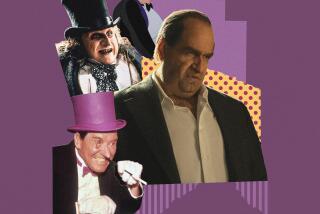I Got You, Babe : PIG.<i> By Andrew Cowan (Harcourt Brace: 224 pp., $21)</i>
- Share via
This first novel about an adolescent boy’s devotion to a pig isn’t calculated to appeal to the same audience that was charmed by E. B. White’s classic, “Charlotte’s Web.” The eponymous beast is a rather gross, aging sow, and Danny, the 15-year-old boy who cares for her, smokes cigarettes and is on the verge of losing his virginity.
The setting is a grimy post-industrial town in northern England. The boy’s family is falling apart. But readers who are tired of being told that the sub-literate prose style of punk writers is uniquely suited to portraying a world in which the young feel worthless should welcome “Pig” as evidence to the contrary.
In sentence upon sentence of finely honed prose, Scottish-born Andrew Cowan meticulously creates a richly textured, thickly detailed portrait of a sensitive young man trying to salvage something of value from the fragments of a shattered world.
Danny lives in a public housing project in a no-longer-prosperous town near a defunct steel mill. Although he is considered a promising student, his home life is dispiriting. His father drinks, his mother is sour and narrow-minded and his older brother Richard is a foul-mouthed layabout with disreputable-seeming cronies. Sister Rachael, married with children, is absorbed in her new family. Mom and Dad fight, sometimes to the point of physical violence.
Danny has found a haven in the home of his grandparents, who live in a small cottage on the outskirts of town, where they keep a pig. Although their humble lifestyle may not strike the casual middle-class observer as enviable (or even tolerable), their home is a bastion of order, security and love in the eyes of their grandson. Gran grows vegetables to make into swill for the pig. Grandad is confined to a wheelchair, having lost a leg to circulatory problems brought on by the cigarettes he still won’t give up. Outside, in her sty, the stoical pig (unlike her predecessors, who were made into bacon) is being allowed to grow old along with her owners.
Danny loves Grandad’s stories of the old days, including his colorful reminiscences of making boars into hogs:
“We used to castrate them ourselves, Danny. Your gran and I. She had the steadier hand so it was my job to hold them, to keep the wee buggers docile. Dab of spirit beforehand, ye know, disinfectant. Then your gran would pinch up the first [testicle] . . . make a wee cut, and squeeze it out. She cut the cords very carefully because ye didnae want blood everywhere, no in the kitchen. Because we had to do it in the kitchen, d’ye see, son, away from the mother.”
What Cowan’s novel manages very skillfully to convey is that decent people like Gran and Grandad can spend the better part of their lives doing work that many would consider brutalizing without losing their humanity in the process. Grandad’s stories of the old days, of neighbors bringing scraps to feed the pig and being given a share of the meat when the beast was slaughtered, seem to Danny like stories of a lost golden age.
When Gran dies, Danny expects his Grandad will move into the bungalow next to his family, where they can look after him. Instead, they want him to go into an old people’s home--which he does, quite cheerfully. The only thing that upsets them more than the prospect of an aging parent next door is when they learn that a Pakistani family will be moving in instead.
Against this background of bitterness and bigotry, Danny spends the summer escaping to his grandparents’ now-deserted cottage, where he faithfully tends the pig and tries to re-create a semblance of the life that once went on there. His companion is his schoolmate Surinder, a pretty Indian girl whose father owns the local supermarket.
While Surinder plans to go to university and study history, Danny’s heart is set on the sadly unrealistic hope of following in his grandparents’ footsteps.
Surinder immerses herself in books about Victorian England and tells Danny horrifying facts about the poverty and squalor in which workers lived. Danny is consumed by a nostalgia for a past he doesn’t really understand. Or is it Surinder who doesn’t understand what Danny values as his grandparents’ legacy?
The two improvise their own little world, discovering the joy and tenderness of sexual love and quasi-domesticity amid the musty old rooms and chipped crockery. But their idyll cannot last.
With its meticulous attention to detail and intense focus on the minute particulars of ordinary life, “Pig” is a sterling example of novelistic realism. And, as in many realist novels, from Zola’s “Germinal” to Flaubert’s “Madame Bovary,” the details perform two functions: creating the look and feel of “real life” while taking on symbolic significance. Thus, the ailing pig, portrayed in its full fleshy, grunting glory, is a very real animal yet also a symbol of a way of life that no longer is viable.
In a final irony (intentional or not, it’s hard to tell), one could say that Danny is a victim of his own “realism,” unable to imagine a way of carrying on his grandparents’ values that does not depend on imitating the outward details of their bygone days. “Pig” portrays the poignancy of its situation in loving, painstaking detail.
More to Read
Sign up for our Book Club newsletter
Get the latest news, events and more from the Los Angeles Times Book Club, and help us get L.A. reading and talking.
You may occasionally receive promotional content from the Los Angeles Times.










